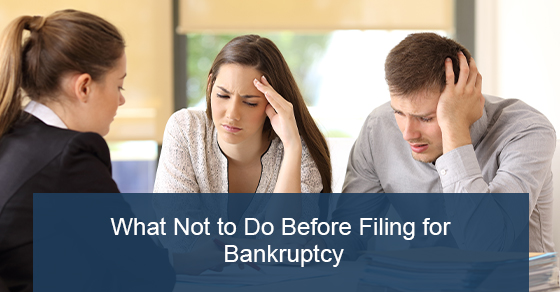Most people have experienced difficult financial situations of some sort. If your economic burdens get too complicated to handle, you are likely researching what options are available to you. While debt consolidation in Etobicoke can seem daunting, you have many different options to fall back on.
One of the standard solutions for debt alleviation is to file for bankruptcy. This effectively provides you with a clean slate and a fresh start. However, because it is a legally binding process, there are consequences to watch out for. You may unknowingly do something that could be viewed as a criminal or legal offence. When considering if you should file for bankruptcy, there are some steps and actions you should avoid.
In this guide, we will walk you through what you should not do before filing for bankruptcy in Etobicoke. Read on for more information.
Selectively Repay Loans
One prevalent mistake when it comes to debt alleviation is to pay back loans selectively. Many people tend to try to pay off friends and family members first before filing for bankruptcy. Although paying those you know personally can feel like a moral obligation, it is a debt consolidation strategy that should be avoided.
Why? Because of the concept of “preferential treatment”. This is when one creditor is favoured or paid off over another right before the borrower files for bankruptcy. This can expose you to liability, as all your remaining money is meant to be distributed amongst your creditors equally. Your trustee may then have to sue the person you just paid to get the money back! This is a detrimental situation for both you and the creditor you attempted to pay back.
The best way to avoid this situation is to not pay back creditors within a three-month period before filing. However, some trustees will look at your financial records for up to a year previously to look for your payout history.
Hide Information
While it can seem like a compelling strategy, hiding your assets, debt, or income is highly damaging in the long run. Remember, bankruptcy is a legal process with legal ramifications. You will need to provide accurate documentation of your finances to your trustee. Hiding any assets is considered a criminal offence and can result in discharge timelines, penalties, and even criminal imprisonment. You will also be signing a Statement of Affairs document, which includes information such as:
- List of things you own
- List of items you owe
- Your creditors
- Financial planning documents
- Budget
A copy of this document is submitted to your creditors for evaluation. You will also need to disclose income received during the bankruptcy process. This can include tax refunds, inheritance, awards, and bonuses.
Transfer Assets From One Account to the Other
Another absolute no-no is to transfer assets and money. Do not try to move them from your name to someone else’s name either. Many people will attempt this strategy to safeguard a certain amount of assets.
This can result in your discharge being denied, and monetary and legal penalties. If you bought property or other assets, they could be seized as part of your bankruptcy agreement.
However, this is not a catch-all law that applies to all transfers. For example, if your transactions were functional and used for utilities, rent, and so on, it is not viewed as a fraudulent transfer. Your trustee will analyze your accounts, looking at between one year to five years prior to filing. If you’re able to justify how you used the money and who it went to, then you would not be penalized. Your trustee can then get the money back through a preferential transfer.
Ignore Collection Calls
One of the worst things you can do before filing for bankruptcy is ignoring collection calls from creditors. This is because creditors can sue you in court if collection efforts have been denied for a sustained period. This can lead to criminal records, garnishing of wages, and freezing of bank accounts. Additional consequences can be the repossessing of assets and home foreclosure.
In some circumstances, creditors may have to return the seized property. This is because the debt consolidation period after bankruptcy is filed after returning owned property. However, this can create lots of legal fees and prolong court processes. It is simply not worth the time, money, and effort to get into a legal situation with your creditors.
Maxed Out Lines of Credit
Maxing out your credit cards right before filing is another mistake to avoid. You can use your credit card for smaller purchases, but if you make big purchases without paying them off, it will be looked at negatively during the filing process. Essentially, you should have an intent to pay off any cards, particularly during the three months before filing.
Watch out for large, excessive transactions. Your trustee will be going through all your records in detail, and if your purchases don’t add up, it can get you in trouble. Running up credit cards right before filing is a strategy some people employ, thinking that these transactions don’t count because they’ll be filing soon anyway. This is simply untrue.
Are you worried about the state of your finances? Filing for bankruptcy is an excellent method of debt consolidation. This will allow you to settle up with your creditors and start your finances anew. It is the best way to move forward and not be weighed down by your debts.
If filing for bankruptcy still seems overwhelming, reach out to our team at Kevin Thatcher & Associates anytime. Our experienced staff is well-versed in all matters relating to debt alleviation and debt consolidation in Etobicoke. We will utilize the best strategies to ensure your bankruptcy process runs smoothly, and that you’re debt-free in no time!
To set up a consultation or meet with a debt consolidation specialist in Etobicoke, call Kevin Thatcher & Associates at 1-888-702-9801 or contact us here.

